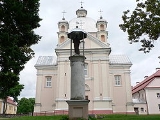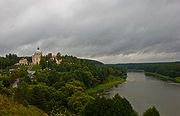
Liškiava
Encyclopedia
Liškiava is a historic village
in the Varėna district municipality
, Lithuania
. It is situated on the bank of Neman River
, near the Lake Liškiavis. In 2005 its population was 37.
A leisure boat route connects Liškiava with the resort of Druskininkai
, a few kilometres south along the river.

erected a stone castle on the hill. Building lost its importance after the Battle of Grunwald
and it was never completed; only the ruins of one tower remains today.
Since the second half of 16th century until 1624 Liškiava church belonged to Protestants. In 1677 a wooden church was rebuilt, and in 1697 the entire town was donated to the Dominican Order
. In 1699–1741 a Dominican monastery and in 1704–1720 a brick Holy Trinity church was built in the town. After the partitions of the Polish–Lithuanian Commonwealth in 1795, it was forbidden to accept new monks to the monastery. Since 1852 monastery was reconstructed into living quarters and parsonage
. After World War II
the building became a school. 1947–1977 it was a recreational base of sartorial factory Lelija.
The Jewish population of Liskova was 146 in 1923. The rabbi of Liskova's Jews
before World War II was Rabbi Avraham Tzvi Weinstein (later of London).
Village
A village is a clustered human settlement or community, larger than a hamlet with the population ranging from a few hundred to a few thousand , Though often located in rural areas, the term urban village is also applied to certain urban neighbourhoods, such as the West Village in Manhattan, New...
in the Varėna district municipality
Varena district municipality
Varėna district municipality is a municipality in southern Lithuania, Alytus County.- History :Along with Vilnius region, a large part of Varėna district municipality was on the Polish side of not-mutually recognized border during the interwar period. This was mainly due the strategic Warsaw –...
, Lithuania
Lithuania
Lithuania , officially the Republic of Lithuania is a country in Northern Europe, the biggest of the three Baltic states. It is situated along the southeastern shore of the Baltic Sea, whereby to the west lie Sweden and Denmark...
. It is situated on the bank of Neman River
Neman River
Neman or Niemen or Nemunas, is a major Eastern European river rising in Belarus and flowing through Lithuania before draining into the Curonian Lagoon and then into the Baltic Sea at Klaipėda. It is the northern border between Lithuania and Russia's Kaliningrad Oblast in its lower reaches...
, near the Lake Liškiavis. In 2005 its population was 37.
A leisure boat route connects Liškiava with the resort of Druskininkai
Druskininkai
Druskininkai is a spa town on the Neman River in southern Lithuania, close to the borders of Belarus and Poland. The city of Druskininkai has a population of 18,233 and dates back as a spa resort to the 19th century.-Names:...
, a few kilometres south along the river.

History
At the end of the 14th century Vytautas the GreatVytautas the Great
Vytautas ; styled "the Great" from the 15th century onwards; c. 1350 October 27, 1430) was one of the most famous rulers of medieval Lithuania. Vytautas was the ruler of the Grand Duchy of Lithuania which chiefly encompassed the Lithuanians and Ruthenians...
erected a stone castle on the hill. Building lost its importance after the Battle of Grunwald
Battle of Grunwald
The Battle of Grunwald or 1st Battle of Tannenberg was fought on 15 July 1410, during the Polish–Lithuanian–Teutonic War. The alliance of the Kingdom of Poland and the Grand Duchy of Lithuania, led respectively by King Jogaila and Grand Duke Vytautas , decisively defeated the Teutonic Knights, led...
and it was never completed; only the ruins of one tower remains today.
Since the second half of 16th century until 1624 Liškiava church belonged to Protestants. In 1677 a wooden church was rebuilt, and in 1697 the entire town was donated to the Dominican Order
Dominican Order
The Order of Preachers , after the 15th century more commonly known as the Dominican Order or Dominicans, is a Catholic religious order founded by Saint Dominic and approved by Pope Honorius III on 22 December 1216 in France...
. In 1699–1741 a Dominican monastery and in 1704–1720 a brick Holy Trinity church was built in the town. After the partitions of the Polish–Lithuanian Commonwealth in 1795, it was forbidden to accept new monks to the monastery. Since 1852 monastery was reconstructed into living quarters and parsonage
Rectory
A rectory is the residence, or former residence, of a rector, most often a Christian cleric, but in some cases an academic rector or other person with that title...
. After World War II
World War II
World War II, or the Second World War , was a global conflict lasting from 1939 to 1945, involving most of the world's nations—including all of the great powers—eventually forming two opposing military alliances: the Allies and the Axis...
the building became a school. 1947–1977 it was a recreational base of sartorial factory Lelija.
The Jewish population of Liskova was 146 in 1923. The rabbi of Liskova's Jews
Jews
The Jews , also known as the Jewish people, are a nation and ethnoreligious group originating in the Israelites or Hebrews of the Ancient Near East. The Jewish ethnicity, nationality, and religion are strongly interrelated, as Judaism is the traditional faith of the Jewish nation...
before World War II was Rabbi Avraham Tzvi Weinstein (later of London).

